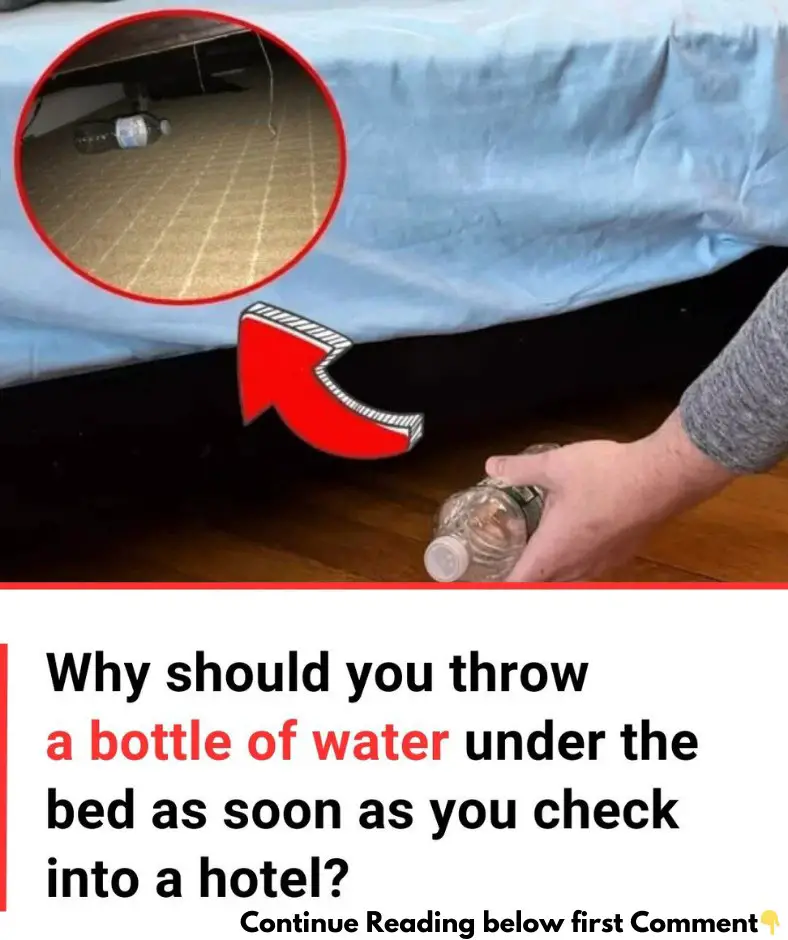Traveling can be an exhilarating experience, but staying safe is equally essential. Many seasoned travelers swear by unique tips that can reveal potential hazards in their hotel rooms. One such trick involves tossing a water bottle under the bed as soon as you check-in. This unusual hack is said to help detect anything hidden under the bed, allowing for a more secure and restful stay. But why is this method so effective, and what other simple steps can ensure a safer experience in unfamiliar accommodations?
Why Throw a Bottle Under the Bed?
Throwing a water bottle under the bed upon arrival is a quick way to uncover any hidden items or suspicious objects that might be beneath. While hotel staff typically clean rooms thoroughly, the space under the bed can sometimes be overlooked. Whether it’s a forgotten item from the previous guest, maintenance tools, or something more unsettling, the bottle trick provides peace of mind. If the bottle moves freely, you’re likely in the clear; if it bumps into something, it might be worth a closer look.
This method has become a favorite among travelers because it’s fast, discrete, and effective. Additionally, it can be done in any hotel, from budget rooms to luxury suites, making it versatile for all types of accommodations.
Other Essential Room Safety Checks
While the bottle trick is a clever safety step, there are additional room checks every traveler should consider for a worry-free stay.
1. Inspect the Room Thoroughly
As soon as you enter the room, a quick survey of the area can help spot any issues. Check behind curtains, inside closets, and especially in small storage spaces. Look for anything unusual or out of place, including personal items left by previous guests or structural issues that might need addressing.
2. Examine the Door Locks and Window Security
Ensure the locks on the door work properly, including any chain locks or secondary security measures. Many hotel doors also come with a peephole cover, which is crucial for privacy. If the cover is missing, a small piece of tissue can temporarily block visibility from the outside.
Additionally, confirm that windows, especially those on lower floors, are locked and secure. In some locations, hotels have balcony access or sliding doors, which should be checked for proper locking mechanisms to prevent unauthorized entry.
3. Familiarize Yourself with Emergency Exits
Knowing the closest emergency exit can be life-saving in a crisis. When entering a new hotel, take note of the emergency exit map often displayed on the back of the room door. Count the number of doors between your room and the nearest exit to ensure you can find it in case of smoke or limited visibility.
4. Utilize Your “Do Not Disturb” Sign and Engage the Safety Lock
Placing the “Do Not Disturb” sign on the outside of your door can be a simple deterrent to anyone trying to enter your room without authorization. This is especially helpful in hotels with significant foot traffic. Additionally, always engage the safety lock or secondary lock while inside, ensuring no one can enter unexpectedly.
5. Keep Valuables in the Safe or Concealed in Luggage
Many hotel rooms are equipped with safes, which provide extra security for items like passports, extra cash, and electronics. If a safe is unavailable, consider concealing valuables within your luggage. It’s also advisable to avoid bringing overly valuable items when traveling to reduce the risk of loss.
Hotel Staff Interactions and Awareness
Hotel staff are typically there to help, but keeping interactions minimal can sometimes be advantageous. Avoid sharing too much personal information, including your room number in public areas. Should you have any concerns, approaching staff discreetly ensures your privacy.
When ordering room service or receiving packages, verify that the person delivering is a staff member by checking their uniform or badge. These small measures add an extra layer of caution and ensure that you remain in control of who has access to your room.
Additional Tips for a Safe Stay
For travelers seeking additional peace of mind, consider these extra tips:
1. Pack a Portable Door Lock or Alarm
Portable door locks or door alarms are compact devices that add extra security. Many of these locks are designed to fit on any standard door, preventing it from opening even if someone has a key. Door alarms can also alert you to unauthorized entry attempts.
2. Maintain Situational Awareness
Trusting your instincts can often prevent trouble. If something feels off about your room or hotel, consider speaking with management or requesting a room change. Familiarity with common travel scams in the region and staying alert to potential threats further improves personal safety.
3. Limit Information on Social Media
While sharing vacation photos is tempting, it’s wise to wait until you’ve returned to post location-specific images. Revealing your exact location in real-time can increase your vulnerability to unauthorized access, as people know you are away from home.
4. Carry a Personal Safety Device
Personal safety devices, such as small, portable alarms, can provide reassurance. When activated, these alarms emit a loud noise that can deter potential threats or draw attention if needed. They’re a helpful addition, especially for solo travelers or those visiting less-familiar places.
Final Thoughts on Hotel Safety
Taking a few extra minutes to inspect your hotel room and employ safety practices can make a big difference. The water bottle trick is just one of many strategies seasoned travelers use to enhance their security. While hotels often strive to provide a safe environment, personal vigilance is essential to ensure a worry-free trip.
Every travel experience is unique, and by incorporating these habits, you can reduce risks and fully enjoy your stay. From checking under the bed to ensuring window locks and familiarizing yourself with emergency exits, these steps foster a sense of control and security. Whether you’re a frequent traveler or embarking on a one-time adventure, these practical tips help create a safer, more enjoyable experience.

